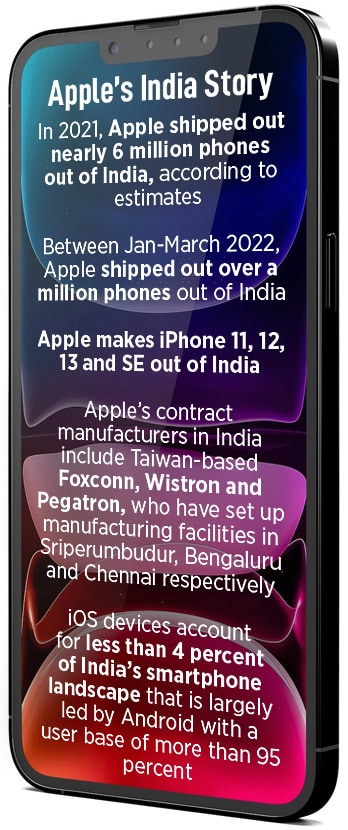
How China's growing supply chain constraints are giving Apple's India play a big boost
The attention to India is very high now for the smartphone manufacturer thanks to the government's production-linked incentive. The push towards localisation in the country has helped Apple in its domestic sales too
 Apple’s contract manufacturers in India include Taiwan-based Foxconn, Wistron and Pegatron, who have set up manufacturing facilities in Sriperumbudur, Bengaluru and Chennai respectively.
Image: Karen Dias/Bloomberg via Getty Images
Apple’s contract manufacturers in India include Taiwan-based Foxconn, Wistron and Pegatron, who have set up manufacturing facilities in Sriperumbudur, Bengaluru and Chennai respectively.
Image: Karen Dias/Bloomberg via Getty Images
It’s certainly no mean feat. For very long, India was never really in Apple's plan when it came to manufacturing its flagship models outside China. Up until 2017, the nation of 1.3 billion, and among the fastest-growing large economy had remained a retail market for the Cupertino-based tech giant, cornering a paltry one percent of the country’s smartphone market.
All that changed in 2017 when Apple’s contract manufacturer Wistron began manufacturing the iPhone SE out of its factory near Bengaluru. Since then, three of Apple’s contract manufacturers have stepped up their presence in the country and are cumulatively shipping over a million phones a quarter out of India, a growth of over 50 percent compared to the previous year. In all, in 2021, Apple shipped out nearly 6 million phones out of India, according to estimates.
Apple’s contract manufacturers in India include Taiwan-based Foxconn, Wistron and Pegatron, who have set up manufacturing facilities in Sriperumbudur, Bengaluru and Chennai respectively. The contract manufacturers make everything from iPhone 11, iPhone 12 and the iPhone 13 at the Foxconn plant, and iPhone 12 and SE at Wistron’s plant in Bengaluru. Pegatron is yet to start manufacturing in the country.
In April, Apple had announced that Foxconn would begin manufacturing the company’s latest offering, the iPhone 13, out of India. “We are excited to begin making iPhone 13—with its beautiful design, advanced camera systems for stunning photos and videos, and the incredible performance of the A15 Bionic chip—right here in India for our local customers,” Apple had said in a statement.
About 70 percent of the Apple smartphones sold in the country are manufactured indigenously. Last year, India accounted for about 3.1 percent of Apple’s global manufacturing base in 2021, a number that’s expected to grow to between 5 percent and 7 percent in 2022, according to estimates by Counterpoint Research. Currently, none of the Pro models is manufactured in India.






 Overall though, shipments of smartphones made in India crossed over 48 million in the first quarter of 2022, according to a new report by Counterpoint Research. According to the report, shipments of devices made in the country grew by 7 percent during the quarter, while manufacturing of feature phones declined by 41 percent. In 2021, Indian manufacturers shipped over 190 million units, a number that’s only expected to grow this year.
Overall though, shipments of smartphones made in India crossed over 48 million in the first quarter of 2022, according to a new report by Counterpoint Research. According to the report, shipments of devices made in the country grew by 7 percent during the quarter, while manufacturing of feature phones declined by 41 percent. In 2021, Indian manufacturers shipped over 190 million units, a number that’s only expected to grow this year. 



